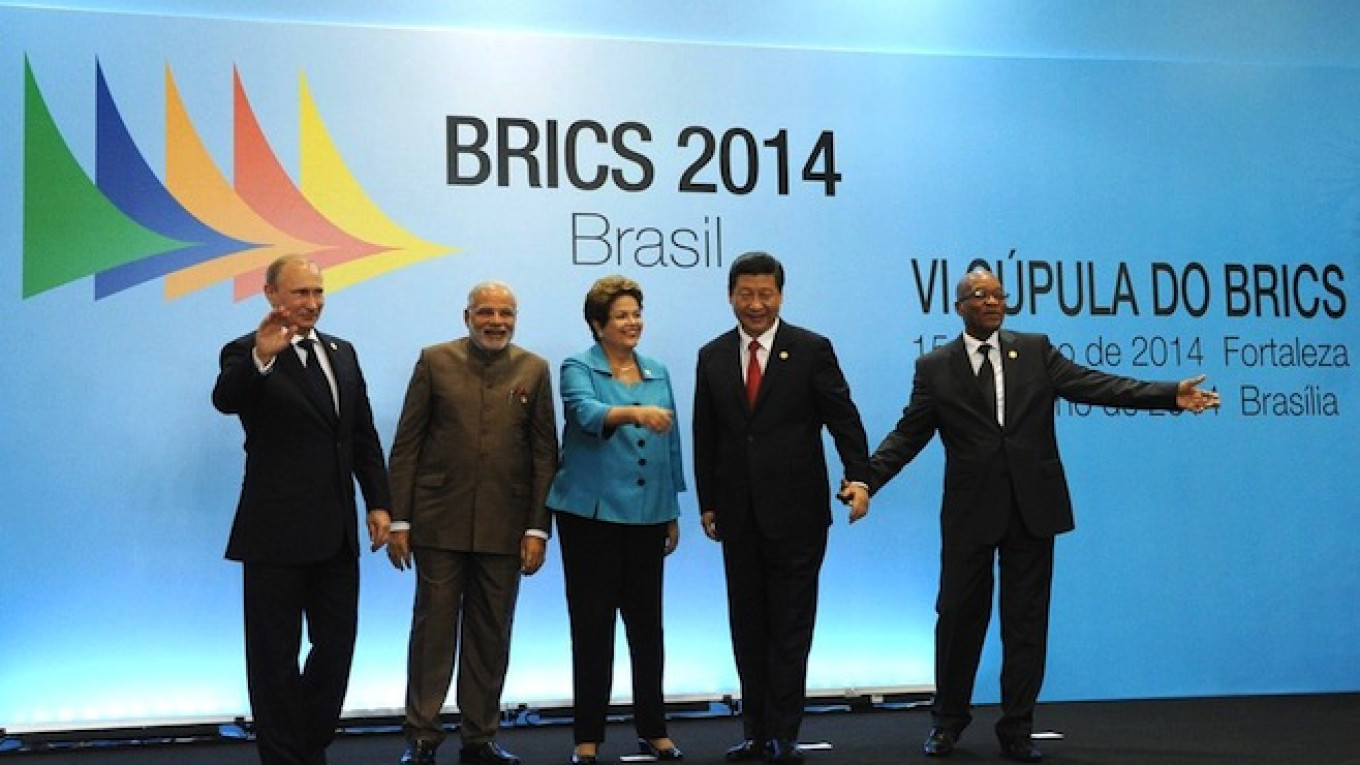The BRICS emerging economies will launch a development bank at a summit this week which President Vladimir Putin hopes will help reduce Western dominance of world financial institutions and show Moscow is not isolated.
At a meeting in the remote Russian city of Ufa, originally a fortress built on the orders of Tsar Ivan the Terrible, Brazil, Russia, India, China and South Africa also aim to put the last touches to a $100-billion contingency currency reserves pool.
The BRICS account for a fifth of the world's economic output and 40 percent of its population. The pool and New Development Bank, with an initial $50 billion in capital, are central to their efforts to reshape the Western-dominated financial system.
"At this meeting we will make operational our two biggest institutions, which is key for us to advance as a group and learn more from each other," said a Brazilian official involved in the preparations for the meeting. "Nobody thought that was going to be possible a year ago when we ratified the proposals."
The official asked not to be named as he is not allowed to speak publicly about the two-day summit starting on Wednesday in Ufa, nearly 1,170 km (730 miles) southeast of Moscow.
For Putin, whose focus has shifted to the emerging economies and especially Asia since the West imposed sanctions on Moscow over its role in the Ukraine crisis, the summit is also a chance to show the West that Russia can get along fine without it.
"The BRICS, in addition to their economic and pragmatic agenda, have become an influential factor in world politics," Russian Foreign Minister Sergei Lavrov said last week.
He denied the five countries' efforts to join forces were aimed against anyone else and praised their "important stabilizing role" in international affairs.
Slow in Coming
The unity of the BRICS nations is important for Putin in his standoff with the West over Ukraine, especially as Russia suffered the symbolic blow of being suspended from the Group of Eight industrial powers over its seizure of the Crimea region.
But independent foreign policy experts say the BRICS group is still a long way from achieving its main goals and Russian ties with China remain less developed than Moscow would like.
Progress on the New Development Bank, first proposed in 2012, has also been slow.
At last year's BRICS summit in Brazil it was agreed the headquarters would be in Shanghai but China ratified the bank only last week and it is not expected to be operational until next year. Its capital still has to be rated to issue debt.
Other emerging markets such as Turkey, Mexico, Indonesia and Nigeria could join as partners at a later date.
The contingency reserves pool is expected to start operating immediately to help members if they are hit by a sudden exodus of foreign capital.
The summit coincides with a meeting in Ufa of the Shanghai Cooperation Organization (SCO), a security bloc grouping China, Russia, Kazakhstan, Kyrgyzstan, Tajikistan and Uzbekistan, which India and Pakistan are set to join.
Putin is also expected to hold talks with Iranian President Hassan Rouhani in Ufa. Iran has observer status in the SCO.
A Message from The Moscow Times:
Dear readers,
We are facing unprecedented challenges. Russia's Prosecutor General's Office has designated The Moscow Times as an "undesirable" organization, criminalizing our work and putting our staff at risk of prosecution. This follows our earlier unjust labeling as a "foreign agent."
These actions are direct attempts to silence independent journalism in Russia. The authorities claim our work "discredits the decisions of the Russian leadership." We see things differently: we strive to provide accurate, unbiased reporting on Russia.
We, the journalists of The Moscow Times, refuse to be silenced. But to continue our work, we need your help.
Your support, no matter how small, makes a world of difference. If you can, please support us monthly starting from just $2. It's quick to set up, and every contribution makes a significant impact.
By supporting The Moscow Times, you're defending open, independent journalism in the face of repression. Thank you for standing with us.
Remind me later.


